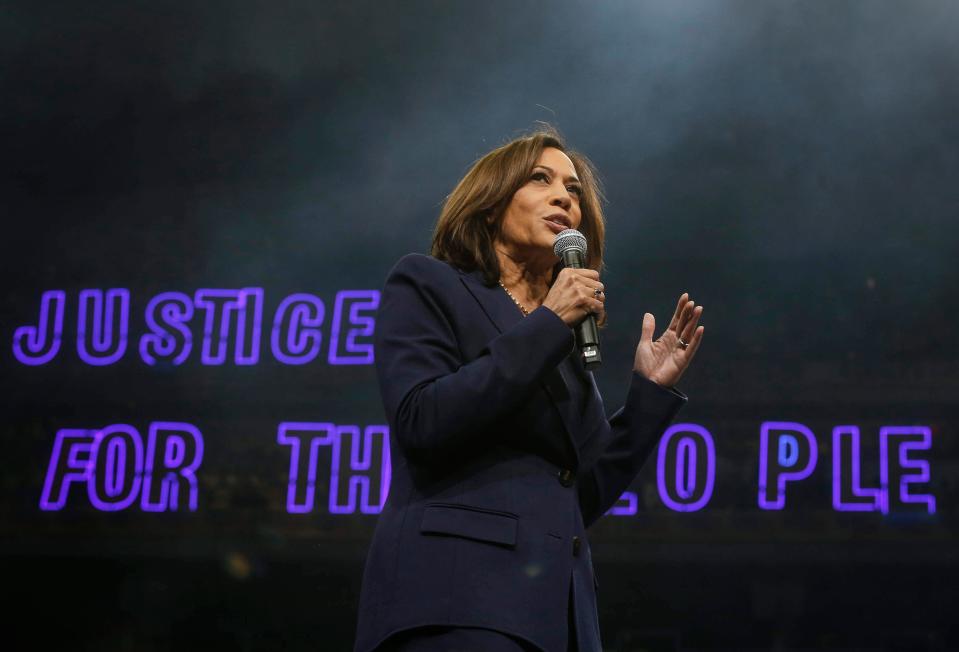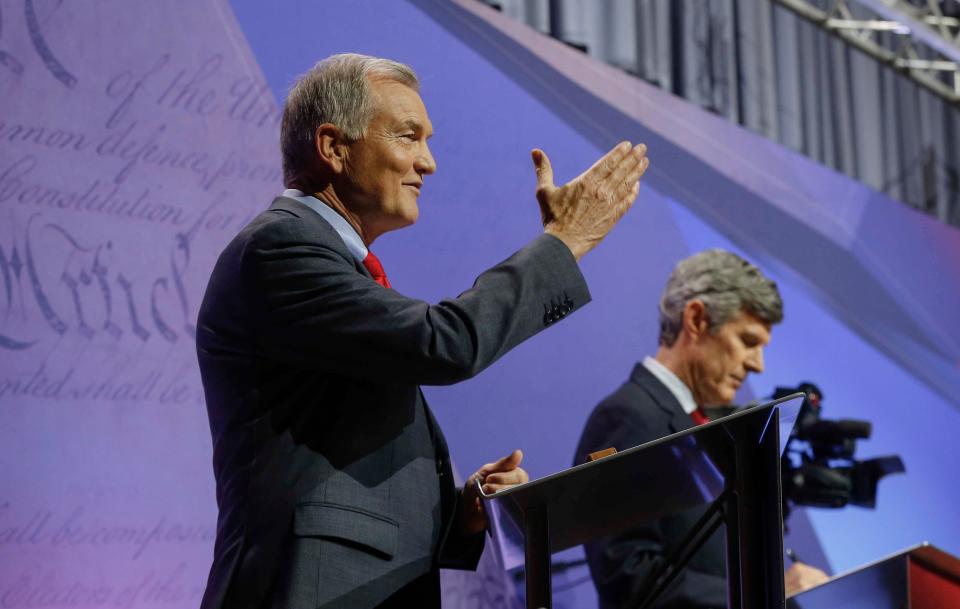As Harris hopes for comeback, Iowa staff additions still not fleshed out

MASON CITY, Iowa — Before she started her stump speech Saturday night, U.S. Sen. Kamala Harris told the crowd about the new office her campaign team opened two blocks away.
"Please come by and visit with us," she said. "And you're always welcome. And we always welcome any help you can give."
The office, one of 10 the Harris campaign opened in Iowa last month, was part of an injection of resources in the state. The campaign more than doubled its paid staff here, and Harris visited Iowa five times in October, telling reporters she is shooting for a top-three finish in the Democratic caucuses.
The team announced a second injection two weeks ago — only with more desperation. Down in the polls and short on funding, Campaign Manager Juan Rodriguez wrote in a memo that campaign would shift workers to Iowa from New Hampshire, Nevada and California. Rodriguez said he and other headquarters staff would also take pay cuts.
Since then, the campaign has still not fleshed out exactly what this second Iowa infusion will look like. It's not clear how many staffers will be relocated to the state or where they all will come from.
Rodriguez's memo was also a bit vague. While he said "many field staff" would come here from New Hampshire, the team laid off its field organizers days later. Three of those organizers said they heard of no plans to come to Iowa.

Broadly speaking, campaign officials in Iowa expect about 20 more workers — bringing the total number of paid staff in the state to 150. They also expect to move about six workers from Baltimore to Des Moines.
Iowa Communications Director Miryam Lipper said the campaign will add digital organizers, schedulers and communications specialists here. Asked where the campaign sees an opportunity for growth in Iowa, she said, "We're trying to just expand capacity across the board."
'We've been in constant contact for the entire campaign," she said of communication between Baltimore and the Iowa offices. "But I think there's something to be said about having everyone squarely focused here on the mission on the ground."
Comeback crunch time
With three months until the caucuses, Lipper said campaign officials hope they can build momentum off Harris's speech at the Iowa Democratic Party Liberty & Justice Celebration on Nov. 1. Her "Justice is on the ballot" rhetorical device received positive reviews from members of the party and some national political writers.
Harris delivered that speech again Saturday night in front of about 200 people at the old City National Bank. She also trotted out a couple of new lines that drew the largest cheers of the night.
"Teachers don't want a gun," she said. "They want a raise."
"Immigrants have helped make America great," she said seconds later. "And somebody needs to remind Donald Trump that some of his closest relatives are immigrants, too."
From her front-row seat, Monica Alarcon nodded her head and shouted "Yes!" in response. She did not know much about Harris before Saturday night and later asked a reporter how to pronounce the presidential candidate's first name.
She entered the town hall leaning toward former Vice President Joe Biden, given his ties to Barack Obama, but she is now leaning toward Harris. Her reaction was not about any specific issue that Harris discussed as much as was about her energy on stage.
"There was a smell of honesty from her," she said. "I can't describe it. No corruption. I didn't smell anything rotten."
Another attendee, Jim Davis, said there's still plenty of time for candidates to make up ground here. But he isn't sure how someone can break through. He has participated in caucuses for 43 years and doesn't remember his neighborhood ever being so flooded with organizers.
During an interview with the Register last week, former New Hampshire organizer Jordan Thompson experienced the same problems. He said voters are exhausted and have "tuned out" from the campaign. At the same time, he believes this creates an opening for a candidate to surge in the polls.
"A lot of people have very bluntly said they are not going to make their decision until the week of the caucus, until the weak of a primary," he told the Register last week. "That's totally understandable. They're getting so many calls from so many campaigns."
Thompson, who was laid off two weeks ago, now counts himself as one of those undecided. He supported Harris because he believed she would offer the strongest counter to President Donald Trump in the general election.
He said he still has many friends on the Harris campaign, and he wants them to succeed. But the way he and his co-workers were laid off left him upset. He declined to say what specifically the campaign's leaders mishandled.
"This has been a difficult experience for many of us," he said. "I can only speak for myself on this, but I believe the handling of the situation was less than ideal. It has simply shifted my opinion on what the future of the campaign is."
Inspiration from the past
In his memo, Rodriguez name-checked two previous presidential candidates who came from behind to win their party's nomination: former U.S. Secretary of State John Kerry, a Democrat, in 2004 and former U.S. Sen. John McCain, a Republican from Arizona, in 2008. The Iowa state political directors for both campaigns said they disagree with the comparison.
Kerry surged in the final months before the 2004 caucuses, according to Des Moines Register polls. He was stuck in third at 15% in November 2003 but overcame Howard Dean and John Edwards to win the state contest.
John Norris, Kerry's Iowa political director at the time, said he convinced the national staff during a September meeting in Des Moines to put Kerry in the state more often. Like with Harris this year, the campaign brought extra organizers into Iowa around that time.

Norris did not attribute the comeback to any particular moment in the race. He said Kerry simply showed up and impressed crowds. Norris rebuffed national campaign officials who asked him to give Kerry a tighter schedule, moving him around the area in shorter appearances.
But Norris insisted that Kerry's 1 1/2-hour policy-laden town halls were making the difference. He believes this could be a problem for a Harris comeback. Fair or not, voters — Norris included — see U.S. Sen. Elizabeth Warren as the wonk in the race.
"[Kerry] could just go in-depth on any issues," Norris said. "At that stage, maybe the marginal caucus voter wasn't making up their mind yet. But people who were really engaged were looking for that."
McCain's Iowa political director, Jon Seaton, also doubts Harris can connect with crowds like his candidate did. But, he concedes, outsiders rarely see a comeback coming.
The summer before the 2004 caucuses, having failed to hit their fundraising goals, the McCain campaign shut down its national headquarters that summer and shifted their teams into Iowa, New Hampshire and South Carolina. In November 2007, according to the Register's poll, McCain was stuck in fifth place in Iowa at 7%.
He clawed back to 13% on caucus night, enough to finish practically tied for third with Fred Thompson. The finish generated plenty of writing about a McCain comeback, which helped him win in New Hampshire and eventually clinch the party's nomination.
Like Norris, Seaton attributes the comeback to impressive performances in smaller venues around the state. In September, with a staff of five, McCain embarked on a "No Surrender" tour through Iowa and defended President George W. Bush's strategy in the Iraq war. In V.F.W. posts and American Legion halls, Seaton noticed that McCain's speeches resonated with crowds.
The campaign didn't see a boost in the polls for months. But looking back, Seaton believes those simple speeches laid the groundwork.
"The bells and whistles — I'm not saying they're insignificant," he said. "It's a good idea to run TV ads. We had a professional campaign. [Harris] has a professional campaign. But these things, especially in the early states, are really driven by candidates' ability to connect with voters and convince them to show up on a cold (caucus) night."
Tyler Jett covers jobs and the economy for the Register. Contact him at 515-284-8215 and tjett@registermedia.com. Follow him on Twitter @LetsJett.
This article originally appeared on Des Moines Register: Election 2020: Kamala Harris hopes for Iowa surge, staff additions unclear

